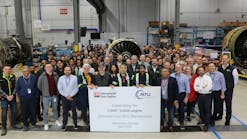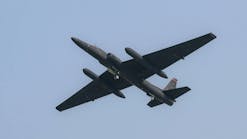For most of its history, SkyWest Inc. has enjoyed labor peace.
No more. As it evolves into a big company, and the turbulence shaking the airline industry continues to intensify, pilots flying for SkyWest's two subsidiaries are becoming restless.
At SkyWest Airlines, more than 100 pilots have formed an organizing committee and are working in earnest with the Air Line Pilots Association to gauge support for a union that would act as the bargaining agent for the carrier's 2,500 aviators.
ALPA is asking the pilots to sign cards that would authorize it to ask the National Mediation Board to conduct a secret-ballot election sometime next year. The union will approach the board if 75 percent of the pilots indicate they want to be represented by ALPA.
The issue driving the pilots to attempt their third organizing effort in seven years has less to do with wages and benefits than it does about more control over their fate in coming years, which many experts say will be marked by instability and consolidations in the airline industry.
"The company has just grown dramatically over the last year. It's gotten to be such a big company, where you can't just walk in and meet with your manager anymore. Everybody knows it's time," said a senior member of the pilot committee who requested that he not be identified for fear of company retaliation.
On another front, pilots who fly for Atlantic Southeast Airlines - bought by SkyWest Inc. last year - are clamoring for a new labor contract to replace one that expired in 2002. ASA's 1,700 pilots, who are represented by ALPA, have put SkyWest on notice that they will strike if a new agreement isn't reached soon.
"If we don't get some negotiating headway made soon, we have made it clear to the company and the National Mediation Board that we will pursue our legal right to strike. . . . We are at a point now where we've exhausted all the tools in our negotiating toolbox," said Rich Bernskoetter, an ASA pilot and ALPA spokesman.
Mike Boyd, an airline analyst with The Boyd Group in Colorado, says the labor disputes are a coincidence. SkyWest Inc. inherited the quarrel between ASA and its unionized pilots when it bought the airline from Delta Air Lines. The fact that SkyWest Airlines has fended off a pilots union for more than 35 years speaks volumes about the company's labor management skills.
"Being part of the pilot's union is like being a member of a country club. The fact that SkyWest pilots are not says a lot, because they haven't thought that they've needed a country club card," Boyd said.
Boyd said the likelihood of consolidation in the regional airline industry is fueling uncertainty among pilots. But he said worries are misplaced.
"There is going to be a shakeout in that part of the industry. But the last to go will be SkyWest, and that will be 30 years from now, and by that time, they'll be in a different business. So, if you are a pilot for SkyWest, by definition, you have job security," Boyd said.
Coincidence or not, SkyWest Inc. is a logical target for union organizers. The St. George-based holding company is a cash cow in the regional airline business. At a time when the big U.S. carriers are struggling with bankruptcies, high fuel bills and stiff competition from low-cost carriers, SkyWest has prospered by providing contract flying services for Delta and United Airlines, which pay its fuel, landing and insurance expenses. Its third-quarter profits grew 35 percent over last year's, to $40.7 million.
"SkyWest, which remains one of our top picks, dominates around 22 percent of the [regional airline] industry's [capacity]. In our opinion, SkyWest stands the best chance to continue to gain market share by obtaining new business" from Delta or other big carriers, airline analyst Ray Neidl of Calyon Securities wrote last month.
The effort by SkyWest Airlines pilots to affiliate with ALPA is their third attempt since 1999 to form a union. Their last try in 2004 failed when only a third of eligible pilots voted for an in-house association to act as their bargaining agent. The decisive defeat was a victory to SkyWest, which argued that a unionized pilot force would hurt its competitive advantage in the regional airline industry. Two years later, the company continues to signal its hostility to a union, whether it is an unaffiliated association of SkyWest pilots or a national union such ALPA.
"There is little doubt that ALPA would be very excited to collect union dues from our 2,500 pilots," SkyWest President Ron Reber said through a spokeswoman.
"We believe our flight deck officers are well represented by SAPA [a company-funded group with no bargaining power] and continue our commitment to open and honest communication with the SAPA representatives," Reber said.
But pilots think the channels of conversation are plugging up, and that view is often expressed in organizing committee meetings and teleconferences that have been conducted in several cities across the West, where SkyWest routes are concentrated.
"They are realizing that right now their future lies in the hands of management and they have very little input into what might happen to the company in the future," said James Magee, a pilot for American Eagle who represented ALPA at a dinner for SkyWest pilots in Salt Lake earlier this month.
"Right now, they have no job protection. There are no guarantees as to what their salaries might be in the future or where they might be based. There are no basic rules about how many days do they work or how often do they work," Magee said.
"We want a legally binding contract. We want some job protections and [for SkyWest] to remove our at-will employment status," said the SkyWest pilot who is a member of the organizing committee.
At ASA, the impasse blocking a new pilot contract is wages. Negotiations that had been stalled earlier this year were restarted in November and are expected to pick up again in January. ASA pilot Bernskoetter said progress was made on "quality-of-life issues," but the sides are far apart on compensation.
"We still haven't talked about the monetary issues, and that's where we are going to find out just how genuinely we are ready to negotiate. Those are the issues that are either going to make or break these negotiations," he said.
It isn't clear what each side is seeking. But ASA spokeswoman Kate Modolo said the airline isn't asking for salary cuts.
"We really want to get a contract that is responsible, that recognizes the importance of our pilot group and our company, that positions ASA to succeed well into the future, not just in the short term," Modolo said.
What are pilots paid?
* SkyWest: Pilot captain with 10 years experience, flying a CRJ regional jet: $74 per hour. Monthly guarantee: 75 hours.
* ASA: Pilot captain with 10 years experience, flying a CRJ-700 regional jet: $81 per hour. Monthly guarantee: 75 hours.
SkyWest
SkyWest Inc. is a fast-growing regional airline holding company, which owns the subsidiaries SkyWest Airlines and Atlantic Southeast Airlines (ASA).
Copyright 2005 LexisNexis, a division of Reed Elsevier Inc. All rights reserved.
Terms and Conditions | Privacy Policy
News stories provided by third parties are not edited by "Site Publication" staff. For suggestions and comments, please click the Contact link at the bottom of this page.





